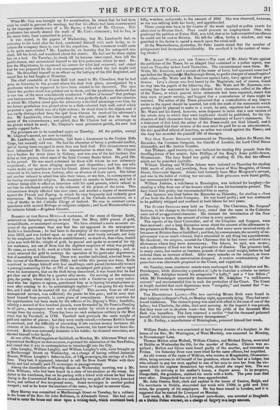MR. ALAR1C WATTS AND THE TIMES.—The case of Mr. Alaric
Watts against the publisher of the Times, for an alleged libel contained in a police report, was tried on Thursday before Lord Tenterden. The circumstances were these. Mr Watts, Mr. Emerson, and a person of the name of Levy, had appeared sometime ago before the Magistratlat Marlborough Street, to prefer charges of assault against each other —Mr. Watts and Mr. Emerson against Levy, Levy against these gen- tlemen. Levy's charge was first heard by the Magistrate, and of course, found its way into the papers of the following day. Mr. Watts and Mr. Emerson, con- ceiving that the statements by Levy affected their character, called at the office of the Times, in which journal these statements had been reported, stated that they were es parte merely, and begged that a contradiction of them might be inserted. The editor of the Times promised that a contradiction of any inaccu- racies in the report should be inserted, but with the truth of the statements which parties might be pleased to make in a court, he said, reporters had no concern. Mr. Watts and his friend, however, were disposed to insist that a new version of the whole story in which they were implicated should be published, for the vin- dication of their characters from the libellous tendency of Levy's statements. To a statement of that kind, the editor of the Times could not lend himself, and it was intimated that their version of the case must be paid for as an advertisement. On this qualified refusal of insertion, an action was raised against the Times; and the Jury has awarded the plaintiff 50/. of damages.
THE OLD BAILEY SESSIONS commenced on Thursday, before the Mayor, the Recorder, the Common Sergeant, the Sheriffs of London, the Lord Chief Baron Alexander, and Mr. Justice Gazetee.
Aim Thomas, aged twenty-six was indicted for stealing fifty pounds from the dwelling-house of her master, John Phillips, of the King's Arms public-house, Westminster. The Jury found her guilty of stealing 41. 19s. that her offence might not be punished capitally. William Meeting and William Adams were indicted on Thursday for stealing 100/. worth of plate, and jewellery, from the house of Miss Musgrave, of Green Street, Grosvenor Square. Adams had formerly been Miss Musgrave's servant, and was in the habit of s isiting her servants. Both prisoners were found guilty, but recommended to mercy. William Jobbins, a watchman in Kensington, was indicted for burglary—for stealing a whip from one of the houses which it was his businesito protect. The
Jury found him guilty, but recommended him to mercy. s John Spencer was tried before the Recorder on Thursday, for stealing a chest of tea from the East India Company. He was found guilty; and was sentenced to be publicly whipped and confined at hard labour for two years.
The SURREY SESSIONS were held on Tuesday. The Chairman, Mr. Sergeant Scriven, in his charge to the Grand Jury, stated that the cases in the Calendar were not of an aggravated character. He deemed the introduction of the New Police likely to lessen the amount of crime in every quarter.
The reports of the Gaol Committee, and of the Chaplain and Surgeon, were then received ; and a long discussion arose about the amount of the allowances to the prisoners at Brixton. Mr. H. Sumner stated, that many more received extra al- lowances at Brixton than at Guildford ; and that, by consequence, the severity of im- prisonment was so much relaxed, that it amounted to any thing but a punishment. Mr. Gardiner, the surgeon, assured the Chairman that he had never ordered extra allowances where they were unnecessary. The labour, he said, was severe; and a sufficiency of food was the best preventive of disease. The prisoners had, in many cases, lost twelve or fourteen pounds of their usual weight, before he had ordered them an increase of food. After many remarks on the subject, as there was no motion made, the conversation dropped. A motion condemnatory of the game-laws was afterwards proposed to the Court, and negatived.
On Tuesday, some courteous retorts were exchanged by Mr. Adolphus and Mr. Prendergast, while discussing a question of sight to examine a witness on certain points. Mr. Adolphus termed his antagonist" a bully," and a "low fellow ;" while Mr Prendergast repeatedly denominated Mr. Adelphus "a well-known coward." and recommended him to seek the protection of the Court. The Court at length decided that such digressions were "irregular," and trusted that "no- thing would occur in consequence."
THE HANOVERIAN Is/tem.—The two surviving Misses Both were found in their lodgings in Regent's Park, on Monday night, apparently dying. They had swal- lowed laudanum. The stomach-pump was used with effect in the case of one of the ladies ; but Charlotte, the elder, died next morning. At the inquest it was proved, that they were not in absolute want—but that the pride of the deceased Miss Both was boundless. The Jury returned a verdict "that the deceased poisoned herself while labouring under temporary derangement."
A Mr. Pedley, a manufacturer of Birmingham, poisoned himself last week.


















 Previous page
Previous page